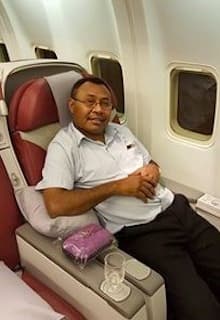More hopeless excuses from the government on SABL
Source: PNG Exposed Blog
We have been waiting two-and-a-half years for the government to cancel the unlawful SABL leases and stop the illegal logging, but they are still making excuses and doing nothing!
Latest to try and explain away the delays is Logging Minister, Douglas Tomuriesa [see story below]. He says 30 months is not a long time to take to implement the findings of the Commission of Inquiry and the government has not been dragging its heels!
The Minister has the cheek to tell landowners and NGOs to be patient, while everyday they watch more forests being felled and more illegal timber being exported.

The Minister promises a new report to be presented next month “will satisfy everyone”. But we have had similar promises before and is the government really going to compensate landowners for all their losses?
PNG government denies dragging chain on SABLs
Papua New Guinea’s Forestry Minister (pictured above) has defended the government’s handling of the controversial Special Agricultural Business Lease system, saying there will be action to conclude the matter soon.
Radio New Zealand
Papua New Guinea’s Forestry Minister denies that the government has been dragging the chain on the handling of the controversial Special Agricultural Business Lease system.
Douglas Tomuriesa said the government is about to table a report by a committee which reviewed the findings of a 2012 Commission of Inquiry into the SABL system.
That Inquiry found that the majority of the leases, which were mainly used for forestry, were largely fraudulently obtained.
Over 5 million hectares of land, or more than 10% of PNG’s total land mass, is estimated to have been affected by the illegal leases.
Mr Tomuriesa spoke to Johnny Blades.
DOUGLAS TOMURIESA: The government has done everything in its powers to monitor the SABLs and to make certain that the SABL comes to a conclusion. And I think we have come to a conclusion now. I want the NGOs, and those commentators especially, to be patient. It’s not so much a delay, it’s nothing to do with the delay tactics that the government is playing. But the government has been very careful in its dealing with the SABL. And I commend the prime minister that in his wisdom, he has taken the bull by the horns and handled the SABL very, very carefully. I think this report that is coming out in the March session (of parliament), it’s a report that will satisfy everybody, especially the landowners and the NGOs and commentators.
JOHNNY BLADES:
The prime minister did tell parliament that most of the leases were fraudulent, as fond by the Commission of Inquiry, that was two or three years ago…
DT: That’s why I’m saying – Johnny – that’s why I’m saying you have to wait until the March session and you’ll see the outcome of this SABL report. I think it is a very fair and good report.
JB: Why did there need to be a review of the inquiry?
DT: Because the inquiry must have all COI members submitting their reports. But when the report came in, only two (of the three commissioners) submitted their reports. One was signed, one was not signed, and the third was never submitted.
JB: And that meant it wasn’t complete, kind of thing?
DT: That’s right. when you look at it in its context, the report that came in was less than half submitted. And I think when the report comes out in March, it’ll be a very good report. I’ve sighted the report but I don’t want to pre-empt on the report.
JB: Does forestry benefit ordinary citizens, people in the rural communities?
DT: The forestry industry has opened up PNG to the remotest parts of the country. When you look at the forest industry… without the forest industry, the roads wouldn’t have gone to the remote areas. You come to Papua New Guinea, Papua New Guinea is a very rugged country. Some areas are very, very remote. But it’s through the forestry industry that we’re able to open up the country. And by us putting roads into the jungles and remote areas, the department of works and other line agencies have followed suit to come and build up those roads, maintain those roads to proper conditions and keep them sealed. And we are able to go into areas where once there was no access. So forestry has contributed a lot to the development of this country.
